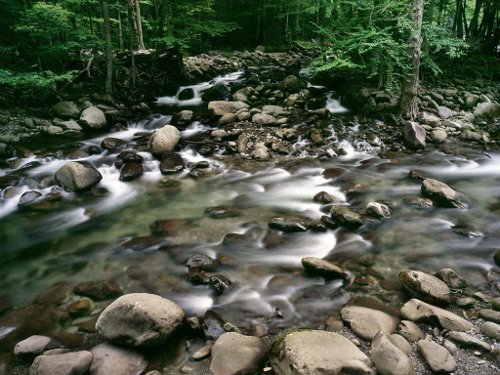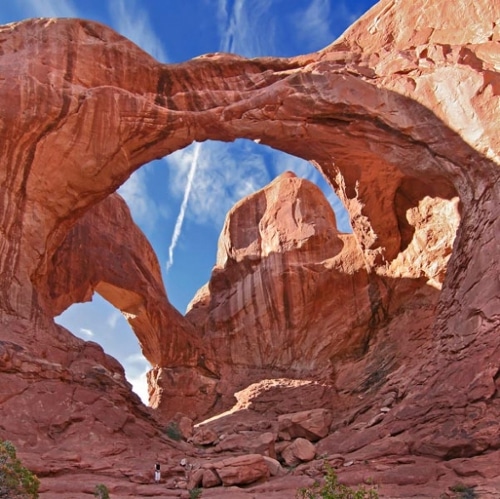
In this Switches of Manliness series, we’ve been talking about those unique parts of a man’s psyche that have fallen into disuse in the modern world and need to be reactivated. But there’s likely some overlap between the needs of men and the needs of women; for example, primitive women used to be quite physical too, and I think modern women need to have an element of physicality in their lives as well. But with this switch, there’s definitely more than a little overlap. The Switch of Nature is for everyone. Men. Women. Children. Squirrels. Well, I think squirrels have it down pretty well. But it’s for everyone and their mom. Literally—your mom needs it too.
Man’s Separation from Nature: The Third “Frontier”
With the rest of the switches, there was a good amount of theorizing going on as we looked back in time and tried to uncover the life and perspective of primitive man. But with this switch, we don’t have to speculate—we can say this with 100% certitude: primitive man spent a lot more time outside in nature than modern man does. Primitive people were surrounded by nature all day, every day. Their lives revolved around it: they supped from it; they created with it; they protected themselves from it; they even worshiped it.
A life that centered on a deep, vital connection to nature was the norm for humans for tens of thousands of years. This connection would only fall apart when the rise of settled agriculture and then the Industrial Revolution made it possible for more and more people to make a living in a way that did not involve the land.
In the Last Child in the Woods, Richard Louv breaks American history into what he sees as the country’s three “frontiers.” The first frontier ended in 1890, when the US Census bureau announced that the line of rugged frontier which had ever been advancing westward had disappeared. The second frontier symbolically ended a hundred years later, when the US government ceased their annual survey of farm residents because that segment of the population had so dramatically constricted, falling from 40% of US households in 1900 to just 1.9% in 1990. Thus Louv argues that the Baby Boomer generation, those born between 1946 and 1964, “may constitute the last generation of Americans to share an intimate, familial attachment to land and water.” Even if Baby Boomers didn’t grow up on a ranch or a farm themselves, they often had a grandparent who had a piece of land, a place that could go visit and get a taste of the wild.
Growing up, my grandpa had a ranch outside of Albuquerqu , and my boyhood visits there are some of my most cherished memories. He’d take my cousins and I on horse rides and let us help him with this chores. I’m pretty sure we slowed him down, but I think he liked having us around.
My grandpa sold his ranch over ten years ago. Now nobody I know personally has a ranch or a farm. And I live in an apartment in the burbs. An area Louv calls the “third frontier.” For the first time in history, the majority of the world’s people live in cities. The third frontier is not a frontier in the traditional sense, but a mishmash of asphalt and grass, a place where people experience what Louv calls, “nature-deficit disorder,” and men walk around with this switch of manliness firmly in the off position.

Nature and a Man’s Health
Every organism has an ideal habitat; take it out of its habitat and it could die, or at least suffer ill-effects. Take a freshwater fish and stick it in a saltwater tank, and soon the fish will be floating belly up.
At the Tulsa Zoo, there is a polar bear exhibit. I was there once on a typical hot, muggy day in the summer, with the temperature soaring past 100 degrees. The polar bear was lying on a concrete slab, his white fur green with algae, his eyes despondent and utterly resigned. I don’t know if zoos have suicide watch, but if so, he would certainly have been under surveillance. It was a sad sight to behold.
I often think about that polar bear when I ponder the state of modern men. For tens of thousands of years our habitat was the wild, and then, in a mere moment in the grand sweep of history, we find ourselves sealed inside climate-controlled pods for nearly 24 hours a day. Sure, we’ve adapted as organisms do, but the more time we spend in our natural habitat, the healthier our minds and bodies become. And studies bear this out.
Time spent outdoors is linked with lower levels of obesity. When I visit Vermont, I am amazed at how fit and lean much of the population is compared to many Oklahomans. Vermonters spend a lot of time outside; we spend a lot of time at Chili’s. If you look at a national map, it’s easy to see a connection between the states that offer the most opportunities for outdoor recreation, and the states with the lowest levels of obesity. Of course there are many more factors involved here, but the proximity and accessibility of nature cannot be discounted.
Nature keeps you mentally sharp. Cities, with their constant noise, crowds of people, and lack of natural surroundings, can tax the human brain. In fact, studies have shown a link between being brought up in the city and the chance of a person developing schizophrenia and other psychotic illnesses. But even if urban dwelling doesn’t give you full on psychosis, it can still tucker out your brain.
Your attention-span functions in two different ways: there is involuntary attention where arresting stimuli grab your attention without you consciously thinking about it, and directed attention, which is purposefully controlled by your cognitive powers. It’s the difference between an animated billboard drawing your gaze, and seeing a motorcyclist ahead of you and deciding to keep an eye on him. Directed attention allows you to shut out other stimuli in order to focus on what’s important. It’s a crucial factor in effective thinking, emotional functioning, short-term memory, and general academic success.
In an urban environment, not only is our involuntary attention kept in overdrive as a myriad of stimuli assault the senses, but our directed attention is greatly taxed as well, as it must constantly work to shut out those grabs for our involuntary attention to focus on what’s important. “Look at that flashing sign…that taxi is coming towards me!”
Thus researchers have found that a walk in nature, where stimuli makes a much less dramatic play for our involuntary attention, allows our directed attention to have a rest, leaving it primed and ready to tackle difficult cognitive tasks once more.
Nature promotes calmness and fights depression. In a study done in Japan, researchers found that after a 20 minute walk in the forest, particpants had “lower concentrations of cortisol, lower pulse rate, lower blood pressure, greater parasympathetic nerve activity, and lower sympathetic nerve activity” than those who spent time in the city instead. In layman’s terms? Walking in the woods mellows you out. In a follow-up study, time spent in nature increased feelings of vigor and decreased feelings of anger, anxiety, and depression.
Those with children, especially boys, should know that studies have also shown that spending time in nature can alleviate the symptoms of ADHD.
Nature boosts your testosterone. Healthy levels of testosterone are vital for feeling like a virile man. Vitamin D has been shown to boost men’s T levels. Sure, you can take Vitamin D supplements….or you can get your vitamin D for free by actually getting outside and exposing your Boo Radley-esque skin to the sun.
Nature fights cancer. In another study done in Japan, researchers had participants spend 3 days and 2 nights in the woods; the participants took long walks in the forest during the day and stayed at a hotel near the forest at night. The participants showed a 50% increase in “natural killer cells” (a component of the body’s immune system that fights cancerous growths), as well as an increase in other anti-cancer proteins. This boost in NK activity lasted for a month after the experience, showing that even if you can only tear out into the woods once in awhile, it is certainly worth it.
Pretty convincing–and convicting–evidence, no? Anecdotally, I find it interesting that nine times out of ten, if Gus is crying and fussing, I can step outside and the fresh air immediately calms him.
What is it about nature that creates these powerful benefits? The lack of over-stimulation is likely one factor. The Japanese researchers believe that it has to do with the wood oils in the trees–that natural aromatherapy is at work. There have even been studies that show that dirt itself contains natural antidepressants.
But other studies have shown that simply looking out a window at nature or even at a video or a picture of nature lessens anxiety and depression, improves mood, boosts immunity, and hastens healing. So perhaps there’s simply something to be said for “biophilia,” the theory proposed by Pulitzer-prize winning author Edward Wilson, who argues that humans have an “urge to affiliate with other forms of life.” Deny that urge, and your mental and physical health suffers.

Nature and a Man’s Soul
There was a time when meadow, grove, and stream
The earth, and every common sight,
To me did seem
Apparelled in celestial light,
The glory and freshness of a dream-William Wadsworth Longfellow, “Ode: Intimations of Immortality from Recollections of Early Childhood”
Longfellow was one of the eminent poets of the Romantic period. Romantics, who came of age as the Industrial Revolution was changing the lay of the land and the way men lived, grew concerned that men were losing their connection to nature and that this separation was having deleterious effects on their spirit. Effects that could not be proven with logic or science, but could intuitively be sensed in a man’s soul.
I suppose I’ve got a bit of the Romantic in me myself, because I have sensed these effects and truly believe they are real. I can personally say that spending time in nature has made me a better man. And I think it can make you a better man too in several ways.
Nature increases your humility. Some studies have shown that narcissism is on the rise among young people. Parents coddle their kids and build up their self-esteem to the point they feel invincible. And technology caters to our every whim, molding itself to our personal interests and preferences.
Nature is pretty and soothing….but it can also literally kill you. It’s not just lovely sunsets and breathtaking canyon views. It’s also grizzly bears and perfect storms. Out in nature you get a renewed sense of your vulnerability. At the foot of a mountain, you sense your true smallness in the world. And nature quickly shatters any notion that the universe revolves around you; it doesn’t stop raining just because you picked that day to go camping.
Nature heightens your senses. We talk through phones and computers. We are entertained through our televisions. We get our food through the grocery store. All of our experiences are mediated through middlemen. When was the last time you had a direct, primary experience? Nature lets you take in all the elements in their most primitive forms, before they’ve been packaged for your consumption.
Nature heightens your creativity. Studies that observed children at play found that they engaged in more imaginative, explorative, and creative play when they played in open, green spaces than when they played on asphalt and in structured spaces. Free of the structure of our daily lives, the lines and rules that rein us in, the minds of adults too, are free to wander. Nature allows both your body and mind to explore, which can lead you to fresh insights about life.
Nature heightens your spirituality. If you’re a religious guy, perhaps the best way to feel close to the Creator is to wander among His creations. The experiences I’ve had where I’ve felt closest to God have not happened in a church pew, but out in the woods.
Nature centers you. It’s an ineffable feeling that I’ve found nowhere else. The jangled pieces of my life that have been rattling around inside my head just fall into place. And I feel a stillness and a peace.
The most important effect nature can have on a man’s spirit, deserves its own section:

Nature as the Cure for Cynicism?
“Man’s heart away from nature becomes hard; [The Lakota] knew that lack of respect for growing, living things soon led to a lack of respect for humans too.” –Standing Bear
Cynicism. I personally believe it is one of the biggest, if not the biggest threat to manliness today. It is the cancer of manhood, eating away at our virility. Why do I think it’s such a threat? Because in answer to the call to live a life of character, honor, and excellence, it says, “Why bother?”
I’ve wanted to write about cynicism since I started the blog, but I haven’t yet….because it is one of my biggest personal struggles, and I simply don’t know what the answer to it is yet. But I do know what one of the things that has helped my cynicism the most is—unplugging and spending time in nature.
Cynicism makes a man jaded and saps his ability to experience wonder and amazement; nature restores it. Nature gives a man back a bit of the heart of a boy, a heart that can acknowledge some mystery in the world. Ralph Waldo Emerson said:
“Crossing a bare common, in snow puddles, at twilight, under a clouded sky, without having in my thoughts any occurrence of special good fortune, I have enjoyed a perfect exhilaration. I am glad to the brink of fear. In the woods too, a man casts off his years, as the snake his slough, and at what period soever of life, is always a child. In the woods, is perpetual youth.”
Another symptom of cynicism is the know-it-all attitude, the belief that there is nothing really interesting or undiscovered out there anymore, nothing that could possibly elicit a response greater than, “Meh.” Nature shows us that the world is full of many more layers than we notice in our day to day lives, that there are always new things to explore. DH Lawrence said:
“Superficially, the world has become small and known. Poor little globe of earth, the tourists trot round you as easily as they trot round the Bois or round Central Park. There is no mystery left, we’ve been there, we’ve seen it, we know all about it. We’ve done the globe and the globe in done.
This is quite true, superficially. On the superficies, horizontally, we’ve been everywhere and done everything, we know all about it. Yet the more we know, superficially, the less we penetrate, vertically. It’s all very well skimming across the surface of the ocean and saying you know all about the sea…
We are mistaken. The know-it-all state of mind is just the result of being outside the mucous-paper wrapping of civilization, Underneath is everything we don’t know and are afraid of knowing.”
Lawrence found his way through the mucous-paper of cynicism when he experienced the wild beauty of New Mexico. He advised others to seek the same “treatment.” “Break through the shiny sterilized wrapping and actually touch the country, and you will never be the same again,” he promised. The fuller quote from Lawrence is quite tremendous, and I have posted it in conjunction with this article as a Manvotional.

How to Turn the Switch of Nature
Of all the Switches of Manliness, the Switch of Nature is perhaps easiest to turn. There are so many small things you can do to get a bit more of the outdoors inside of yourself. Remember, even looking through a window at nature helps people (so for goodness sake, stop putting those tv’s in the back of your car for the kids!).
You may live in the country, have a job that keeps you outside all day, or be lucky enough to know someone with a farm or ranch where you can go hang out whenever you’d like. But I know there are some men out there whose only time outside is when they’re walking to and from their car during the day. For these guys, make it a goal to spend at least an hour outside every day. It doesn’t seem like much, but it can make a big difference—remember, small and simple changes add up and can turn the switch to the on position. Here are a few suggestions to get started:
- Do your workout outside. A study found that “compared with exercising indoors, exercising in natural environments was associated with greater feelings of revitalization and positive engagement, decreases in tension, confusion, anger, and depression, and increased energy.”
- Go to a park to eat your lunch. If there’s no park near your workplace, at least eat in the car with the windows down.
- Go for a nightly after dinner walk.
- Do chores like mowing the lawn and raking leaves yourself instead of hiring someone to do it for you.
- Read, surf, or work on the patio or apartment balcony.
- On nice days, open your windows at home and in the car. On a cloudless 70 degree day most of the windows in our apartment complex are closed and everyone is driving around with the windows up in their cars. It makes me wonder sometimes if the whole world has gone mad.
- Go on a picnic date.
- Walk to your errands.
- Ride your bike to work.
- Find a hobby or sport that requires you to be outside. There are dozens to choose from: Skiing, skateboarding, surfing, running, gardening, geocaching, hunting, fishing, and so on and so forth.
- Go camping. Talk about a no brainer. But you need to stop thinking about camping like it has to be a long, elaborately planned trip. Even one night helps. I know you’ll feel inertia—you’ll feel like getting everything together and driving to the campsite won’t be worth it. Even one night is worth it. It will refresh you.
What are some other ways to spend more time in nature? How has spending time in nature made you a better man?
Source:
Last Child in the Woods: Saving Our Children from Nature-Deficiet Disorder by Richard Louv
Switches of Manliness Series:
The Cure for the Modern Male Malaise
Switch #1: Physicality
Switch #2: Challenge
Switch #3: Legacy
Switch #4: Provide
Switch #5: Nature







